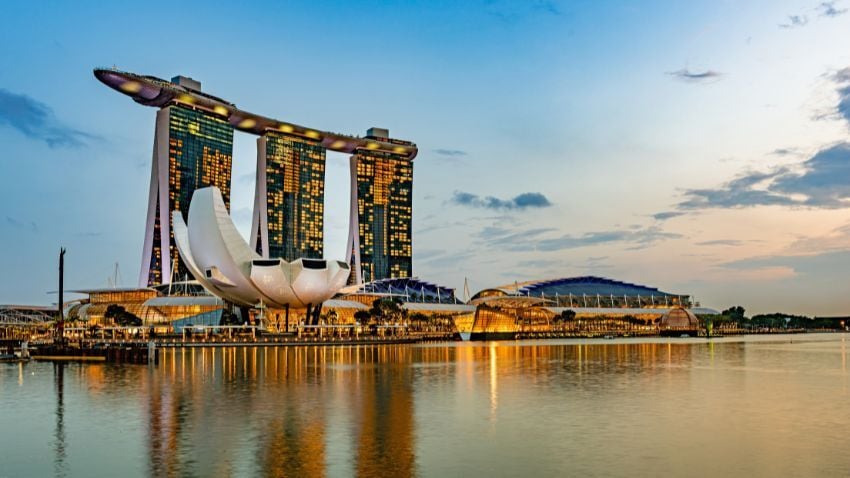Living In Singapore: Pros & Cons You Should Know
Singapore is often described as a city that works, and it totally deserves its reputation. This small island nation in Southeast Asia has built one...

6 min read
We all have heard the term "old money." Of course, it isn’t the money that gets old, but ultra-rich families that survive, preserving and growing their wealth from one generation to the next. A family is a generational bond formed not only through bloodline, but also through shared beliefs, behavioural codes, and social practices that evolve into family traditions. Among the most important of these traditions is passing down the ability to make sound economic decisions for future generations.
An individual's efforts alone are insufficient to create generational wealth. Most wealth is lost by the third generation. We've all heard it, "shirtsleeves to shirtsleeves in three generations."
Therefore, if your intention is for your grandchildren to be associated with "old money", you must establish a family constitution to manage family affairs and investment strategies, and cultivate a tradition that guides economic behaviour and investment decisions. Being an ultra-rich family for generations is not an accident.
Building a strong structure requires institutionalizing family traditions and values into actionable guidelines. The Offshore Family Office (OFO) steps in to build that foundation, growing and preserving generational wealth in a world exposed to constant change.

Break the three-generation cycle - intentional planning passes on more than wealth; it preserves values, discipline, and a lasting family legacy
The Three-Generation Pattern has played out across cultures and centuries as a predictable yet subtle erosion of family fortunes. The first generation starts with almost nothing. They take risks, work tirelessly, and innovate their way into prosperity.
The second generation grows up watching that journey. They understand the effort, but they didn't live it. So they become stewards, careful, cautious, often focused on preserving rather than expanding wealth.
By the third generation, the story of the first generation feels like a distant legend. They inherit the wealth, but not the mindset. Without the hardship or context that forged the original values, the spoiled third generation lacks the discipline and the talent to sustain the wealth.
The pattern works through a cycle: creating, protecting, and wasting the wealth. However, this cycle is not inevitable. You can break the pattern with intentional planning, not just through legal and financial structures, but also by establishing a system that passes on decision-making skills, shared values, and a clear family identity.
I've had the opportunity to work with ultra-rich families who have weathered nearly every challenge: wars, political upheavals, and financial crises. Let me say this to you: the ones who stay strong through it all tend to have a few things in common. Here is a snapshot of the principles to help you build a resilient family.
Have A Clear Vision That Spans Generations: These families don't just talk about wealth, but about what it's for—the legacy. The founders were thinking about how to empower great-grandkids they'd likely never meet.
Set Up Strong Governance and Clear Expectations: Generational ultra-wealthy families recognize that simply offering advice to their children and grandchildren is insufficient to instill the right mindset. They define roles, write down their values, and agree on how decisions are made in order to build a governance structure that extends beyond a single generation.
Build Strategically Across Jurisdictions: Families with generational wealth don't tie their fortunes to one country, one market, or one legal system. They utilize offshore tools, such as trusts, holding companies, and diversified residency strategies.
Have A Real Plan To Bring In The Next Generation: None of the ultra-wealthy families simply hope that their kids will "figure it out" regarding how to grow and preserve their wealth. They teach them how to manage money, help them understand the meaning of wealth, and encourage them to take responsibility.
Evolve: Generational wealth cannot be preserved by clinging to outdated methods or ignoring new realities as challenges and opportunities arise. Ultra-wealthy families understand the importance of adopting governance rules and structures that align with new political and economic environments without compromising their values.
An Offshore Family Office isn't just about moving money offshore, but about building a structure that holds a family together when the world around them is falling apart. The OFO weaves together legal, financial, and governance tools to create a durable framework that protects family assets in alignment with family values across borders.
If a country experiences political turmoil, economic collapse, or sudden legal changes, the family's assets—and the plan to manage them—can be severely endangered in irreparable ways. An OFO spreads risks by diversifying assets across multiple jurisdictions under different legal structures, aligning with the long-term family strategy.
A good OFO focuses on managing the family and its enduring generational assets rather than just managing the money. To achieve this vital task, it includes charters or constitutions that clarify the family's values, outline decision-making processes, and define leadership roles. Governance documents help families avoid power struggles and keep everyone on the same page, especially as the family grows.
As the world order continues to crumble and future geopolitics remain unpredictable, adaptability is an indispensable tool for wealth preservation. The OFO allows families to pivot without having to start from scratch every time the world changes. The legal structures built into an OFO enable families to adjust their investment strategies and modify their tax exposure.
With clear rules about who gets what and when, an OFO helps support the family without turning wealth into a crutch. It sets healthy boundaries by making the next generation responsible and capable, rather than automatically granting them money or benefits simply because they were born into a wealthy family.
In a world obsessed with transparency and control, the OFO offers something rare: discretion. Not secrecy for secrecy's sake, but the ability to operate on your own terms, outside the reach of constantly shifting domestic policies.

Structures endure when families plan beyond wealth—building resilience with education, shared values, and clear succession systems
Stories teach more effectively than advice, so let's examine three quick, anonymous examples.
Case 1 — The "Home-Bound" Office Vs. The Offshore Family Office:
Family A kept everything—companies, trusts, even their family office—inside one country. When a populist government swept in, inheritance taxes tripled overnight. Succession plans stalled, litigation followed, and half their fortune evaporated in three years.
Family B ran an Offshore Family Office with assets and entities spread across three jurisdictions and a clear line of succession outlined in their charter. When new taxes were imposed in their home country, only a portion of their wealth was affected. The transition to the next generation happened on schedule, with minimal friction.
Case 2 — Advisor-Dependent Vs. In-House Training:
Family A outsourced every decision to outside advisors. The heirs signed papers they didn't understand and tuned out in board meetings. After the founder's death, the advisors lost direction, and as a result, financial results worsened. Assets remained, but the purpose behind them got lost.
Family B also relied on specialists, but they made education a core part of their Offshore Family Office by offering internships for teenagers, shadowing opportunities with voting shares for those in their twenties, and joint venture projects for those in their thirties. Advisors guided, but heirs learned to steer their own course. When control transferred, the next generation already had a hand on the wheel.
Case 3 — Rich In Assets, Poor In Values Vs. Modest Wealth, Strong Rules:
Family A sold a tech company for nine figures but never wrote down shared values or distribution rules. Within a decade, cousins were in court over the usage of a holiday home and dividend splits. The wealth remained, but the unity, trust, and sense of purpose had faded away.
Family B held a "mere" $40 million USD portfolio. Their Offshore Family Office was modest yet meticulous: a living family constitution, quarterly strategy retreats, and distributions tied to educational milestones and entrepreneurial co-investment. Two generations in, they still vote unanimously on major moves, and the capital is growing.

Wealth becomes legacy when clarity, structure, and purpose guide each generation
True generational wealth is measured by a family's ability to stay united across time and geography. The trusts, foundations, governance charters, and distribution rules you build into the OFO structure become the steel beams that hold the family together when markets crash, borders close, or policies change.
Money, by itself, can magnify conflict, foster entitlement, and lead to drift without being structured in an OFO. By spelling out the family's purpose, codifying decision-making, and diversifying across jurisdictions, an OFO transforms capital into a multi-generational offshore system that keeps values alive while allowing each generation to add its own chapter.
Wealth lasts across generations when a family defines its purpose and builds a solid structure to support that vision. An Offshore Family Office (OFO) is the most effective tool to turn money into a lasting legacy because it provides everything needed to achieve that goal:
Diversification of assets across jurisdictions to manage risks in an increasingly unpredictable world.
Built-in governance through family charters, succession plans, and distribution rules to ensure clear, fair, and consistent decision-making.
Education and engagement of the next generation, equipping them with the skills and mindset needed to carry the legacy forward.
Without a clear purpose and strong framework, wealth often fragments over time. But wealth anchored by an OFO—with defined goals, structured rules, and generational involvement—can grow stronger with each generation.
If you want the best intel from the expat world, including profitable offshore opportunities, little-known tax-saving strategies, and hard-won insights on immigration, passports, and Plan-B residencies, all delivered to your inbox every single week, then join our daily correspondence, EMS Pulse®. Currently enjoyed by over 84,000 expats and expat-hopefuls worldwide. Fill in the form below to join our newsletter free:

Written by Mikkel Thorup
Mikkel Thorup is the world’s most sought-after expat consultant. He focuses on helping high-net-worth private clients to legally mitigate tax liabilities, obtain a second residency and citizenship, and assemble a portfolio of foreign investments including international real estate, timber plantations, agricultural land and other hard-money tangible assets. Mikkel is the Founder and CEO at Expat Money®, a private consulting firm started in 2017. He hosts the popular weekly podcast, the Expat Money Show, and wrote the definitive #1-Best Selling book Expat Secrets - How To Pay Zero Taxes, Live Overseas And Make Giant Piles Of Money, and his second book: Expats Guide On Moving To Mexico.

Singapore is often described as a city that works, and it totally deserves its reputation. This small island nation in Southeast Asia has built one...

Panama’s geographic size is modest, but its global relevance is not. The country connects two oceans and two continents, operates on a dollarized...

Honduras’ newly elected president, Nasry Asfura of the conservative National Party, was sworn in on January 27, 2026. The election, held on November...